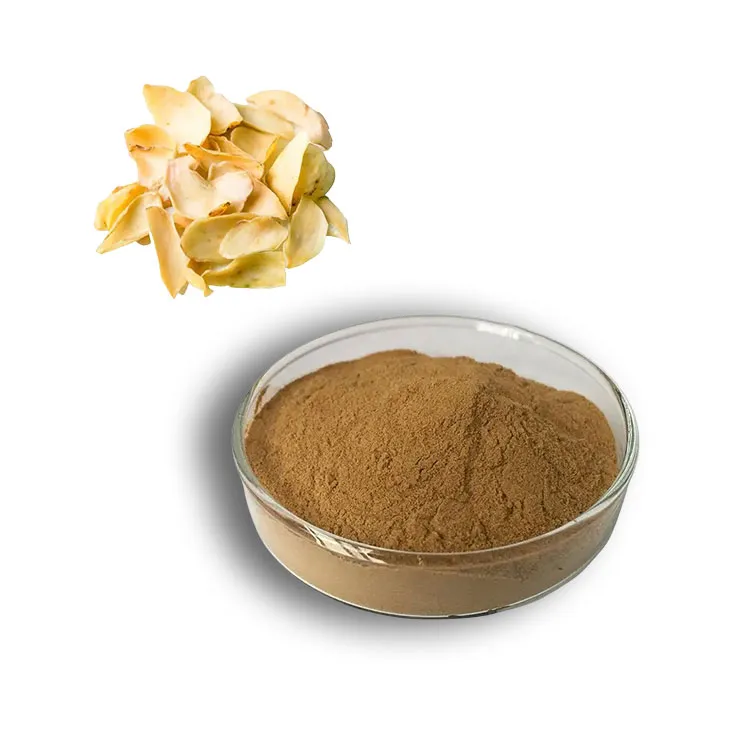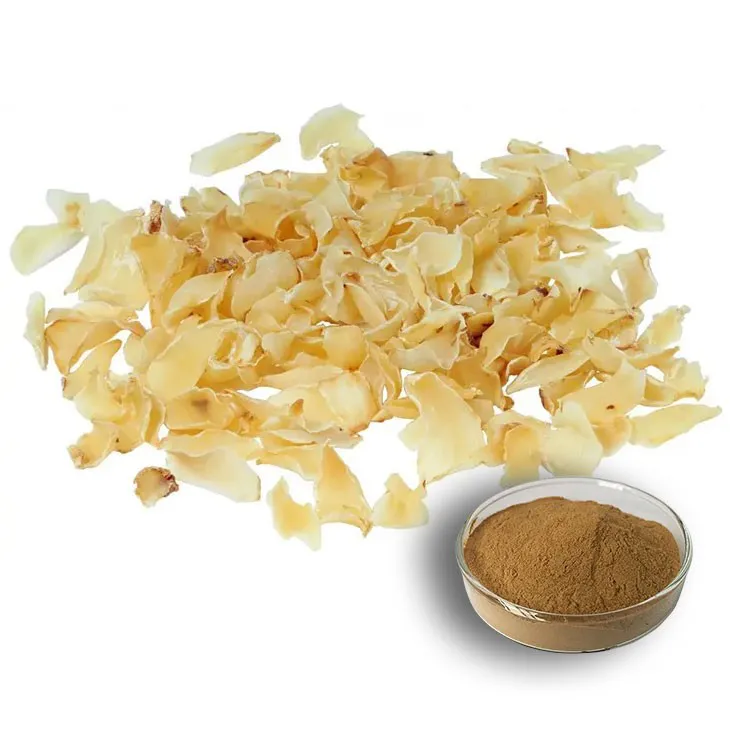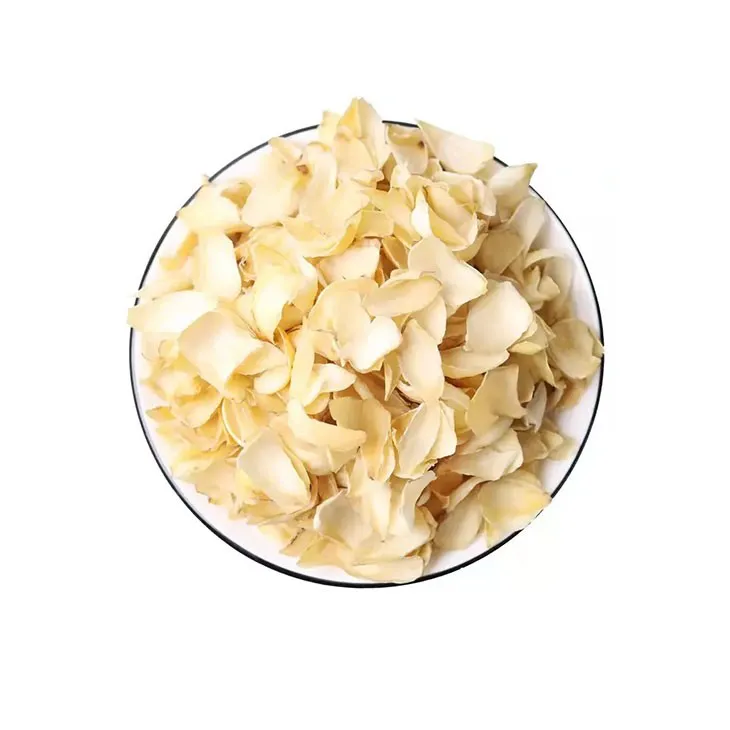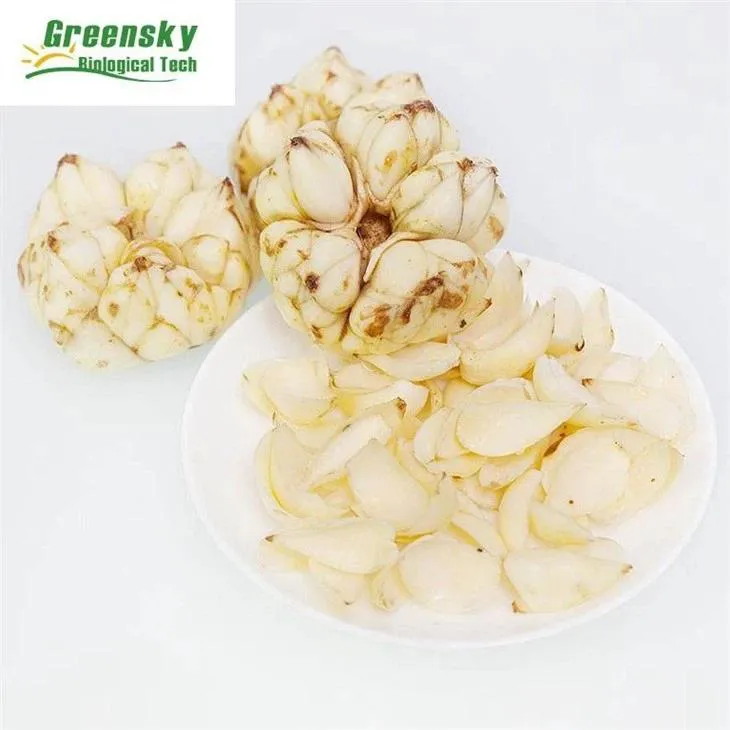- 0086-571-85302990
- sales@greenskybio.com
Lily Extract: What Are the Benefits and How to Take It?
2024-11-12

Introduction
Lily extract has been a subject of interest in various fields, including traditional medicine and modern health research. Derived from different species of lilies, this extract is believed to possess a range of beneficial properties. In this article, we will explore in detail the potential benefits of Lily extract and the different ways it can be consumed.

Benefits of Lily extract
1. Skin Health
Anti - Inflammatory Effects on Skin: One of the significant benefits of lily extract for the skin is its anti - inflammatory properties. Inflammation can be a major cause of various skin problems such as acne, eczema, and psoriasis. The components in lily extract can help soothe irritated skin, reducing redness and swelling. For example, certain flavonoids present in lily extract have been shown to inhibit the production of inflammatory mediators in the skin cells.
Moisturizing and Nourishing: Lily extract also has the potential to moisturize the skin. It contains natural compounds that can help improve the skin's barrier function, preventing moisture loss. This can leave the skin feeling soft and supple. Moreover, it provides essential nutrients to the skin, promoting overall skin health and a healthy glow.
2. Support for the Immune System
The immune - boosting potential of lily extract is another important aspect. It contains various bioactive compounds that can stimulate the immune system. For instance, polysaccharides in lily extract have been studied for their ability to enhance the activity of immune cells such as macrophages and lymphocytes. These cells play a crucial role in the body's defense against pathogens, including bacteria, viruses, and fungi.
By strengthening the immune system, lily extract may help the body to better resist infections and diseases. It can also potentially reduce the severity and duration of illness when the body is exposed to harmful microorganisms.
3. Antioxidant Properties
Lily extract is rich in antioxidants. Antioxidants are substances that can neutralize free radicals in the body. Free radicals are unstable molecules that can cause oxidative stress, which is linked to numerous health problems, including aging, cancer, and cardiovascular diseases. The antioxidants in lily extract, such as vitamin C, flavonoids, and phenolic acids, can scavenge these free radicals, protecting the body's cells and tissues from damage.
These antioxidant properties not only contribute to overall health but also have implications for skin health. By reducing oxidative stress in the skin, lily extract can help prevent premature aging, such as the formation of wrinkles and fine lines.
4. Other Potential Benefits
There are some other potential benefits associated with lily extract that are still being explored. Some research suggests that it may have a role in improving digestion. It could potentially help in the proper functioning of the digestive system by promoting the growth of beneficial gut bacteria and enhancing intestinal motility.
Additionally, lily extract may have a calming effect on the nervous system. In traditional medicine, lilies have been used to relieve stress and anxiety. While more research is needed to confirm these effects at a scientific level, the anecdotal evidence and preliminary studies show promising potential in this area.

How to Take Lily Extract
1. Tinctures
Tinctures are liquid extracts that are typically made by soaking the lily plant material in a solvent, usually alcohol or a mixture of alcohol and water. Here's how you can use lily tincture:
- Dosage: The recommended dosage of lily tincture can vary depending on various factors such as age, health condition, and the purpose of use. Generally, it is advisable to start with a small dose, for example, 1 - 2 milliliters, and gradually increase if needed. However, it is crucial to consult a healthcare professional before determining the appropriate dosage.
- Administration: Lily tincture can be taken directly under the tongue. Hold the tincture in the mouth for a few seconds before swallowing. This method allows for faster absorption into the bloodstream as the mucous membranes in the mouth can absorb the active compounds directly.
- Timing: It can be taken once or twice a day, preferably on an empty stomach for better absorption. However, if it causes any discomfort, it can be taken with a small amount of food.
2. Capsules
Lily extract capsules are a convenient way to consume the extract. Here are the key points regarding their use:
- Dosage: Similar to tinctures, the dosage of lily extract capsules should be determined based on individual factors. A typical dosage might be one or two capsules per day. However, always follow the instructions on the product label or consult a doctor.
- Administration: Capsules should be swallowed whole with a glass of water. Do not crush or chew the capsules unless specifically instructed by a healthcare provider. This is to ensure that the active ingredients are released and absorbed properly in the digestive system.
- Quality and Purity: When choosing lily extract capsules, it is important to select a high - quality product. Look for products that are from a reputable manufacturer and have been tested for purity and potency. This can help ensure that you are getting the intended benefits without any potential risks associated with contaminants.
3. Topical Application
For those interested in using lily extract for skin - related benefits, topical application is an option.
- Lily Extract - Based Skincare Products: There are various skincare products available in the market that contain lily extract, such as creams, lotions, and serums. When using these products, follow the instructions on the packaging. Generally, cleanse the skin thoroughly before applying the product and gently massage it into the skin until fully absorbed.
- Homemade Remedies: You can also make your own lily - extract - based skincare remedies at home. For example, you can make a lily extract face mask by mixing a small amount of lily tincture with a suitable base such as aloe vera gel or honey. Apply the mask to the face, leave it on for 10 - 15 minutes, and then rinse off with lukewarm water. However, when making homemade remedies, ensure that you use pure and safe ingredients and be aware of any potential allergies.

Precautions and Considerations
While lily extract offers potential benefits, there are also some precautions to keep in mind.
1. Allergies
Some individuals may be allergic to lilies. Allergic reactions can range from mild symptoms such as skin itching and rashes to more severe reactions like difficulty breathing and swelling of the face, lips, or tongue. Before using lily extract, it is important to perform a patch test if using it topically or start with a very small dose if taking it orally to check for any allergic reactions.
2. Interaction with Medications
If you are taking any medications, there is a possibility of interactions with lily extract. For example, if you are on immunosuppressive drugs, the immune - enhancing effects of lily extract may interfere with the action of these medications. It is essential to consult your doctor or pharmacist if you are taking any medications and plan to use lily extract.
3. Pregnancy and Breastfeeding
There is limited research on the safety of lily extract during pregnancy and breastfeeding. As a precaution, it is advisable for pregnant and breastfeeding women to avoid using lily extract unless specifically recommended by a healthcare provider.

Conclusion
Lily extract shows great potential in terms of its benefits for skin health, immune support, and antioxidant properties. However, it is important to use it safely and appropriately. Whether you choose to take it in the form of tinctures, capsules, or use it topically, always be aware of the potential risks and consult a healthcare professional when in doubt. With further research, we may discover even more about the full potential of lily extract and how it can be integrated into our health and wellness regimens.
FAQ:
What are the main benefits of lily extract?
Lily extract has several main benefits. It can contribute to better skin health as it has anti - inflammatory effects, which may help soothe irritated skin and potentially reduce skin redness. Moreover, it may support the immune system, helping the body defend against diseases and infections.
Can lily extract really improve skin health?
Yes, it is likely to improve skin health. The anti - inflammatory properties of lily extract play a key role. Inflammation can cause various skin problems, such as acne, redness and irritation. By reducing inflammation, lily extract may help the skin look healthier, smoother and more radiant.
How does lily extract support the immune system?
Although the exact mechanisms are still being studied, lily extract may contain certain bioactive compounds that interact with the body's immune cells. These compounds may enhance the function of immune cells, making them more effective at recognizing and fighting off pathogens, thus supporting the overall immune system.
What are the different forms of lily extract for consumption?
There are different forms of lily extract available for consumption. Tinctures are one form, which are liquid extracts that can be taken orally. Capsules are also common, which are convenient for those who prefer a pre - measured dose. Additionally, there may be lily extract in some skincare products for topical application to benefit the skin.
Are there any side effects of taking lily extract?
While lily extract is generally considered safe for most people, some individuals may experience side effects. For example, allergic reactions may occur in those who are allergic to lilies. Also, if taken in excessive amounts, it may cause digestive discomfort. However, such cases are relatively rare and it is important to follow the recommended dosage.
Related literature
- The Benefits of Lily Extract in Skin Health"
- "Lily Extract and Immune System Support: A Review"
- "Forms and Applications of Lily Extract"
- ▶ Hesperidin
- ▶ citrus bioflavonoids
- ▶ plant extract
- ▶ lycopene
- ▶ Diosmin
- ▶ Grape seed extract
- ▶ Sea buckthorn Juice Powder
- ▶ Beetroot powder
- ▶ Hops Extract
- ▶ Artichoke Extract
- ▶ Reishi mushroom extract
- ▶ Astaxanthin
- ▶ Green Tea Extract
- ▶ Curcumin Extract
- ▶ Horse Chestnut Extract
- ▶ Other Problems
- ▶ Boswellia Serrata Extract
- ▶ Resveratrol Extract
- ▶ Marigold Extract
- ▶ Grape Leaf Extract
- ▶ blog3
-
Cranberry Plants and Skin - care Products.
2024-11-12
-
Motherwort Extract
2024-11-12
-
Aminolevulinic acid
2024-11-12
-
Red Wine Extract
2024-11-12
-
Berberis aristata Extract
2024-11-12
-
Licorice Root Extract Powder
2024-11-12
-
Sea buckthorn oil
2024-11-12
-
Withania Somnifera Extract
2024-11-12
-
Europen Bilberry Extract
2024-11-12
-
Beetroot Powder
2024-11-12
-
Oat Straw Extract Powder
2024-11-12





















